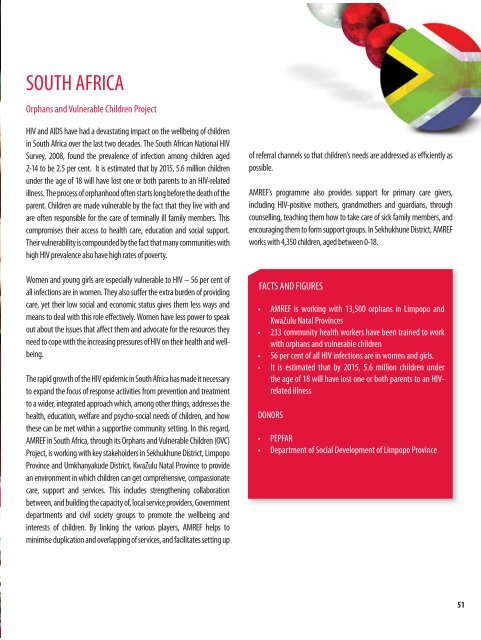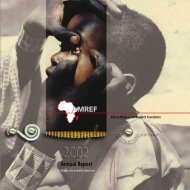Celebrating African Motherhood - Amref
Celebrating African Motherhood - Amref
Celebrating African Motherhood - Amref
Create successful ePaper yourself
Turn your PDF publications into a flip-book with our unique Google optimized e-Paper software.
SOUTH AFRICA<br />
Orphans and Vulnerable Children Project<br />
HIV and AIDS have had a devastating impact on the wellbeing of children<br />
in South Africa over the last two decades. The South <strong>African</strong> National HIV<br />
Survey, 2008, found the prevalence of infection among children aged<br />
2-14 to be 2.5 per cent. It is estimated that by 2015, 5.6 million children<br />
under the age of 18 will have lost one or both parents to an HIV-related<br />
illness. The process of orphanhood often starts long before the death of the<br />
parent. Children are made vulnerable by the fact that they live with and<br />
are often responsible for the care of terminally ill family members. This<br />
compromises their access to health care, education and social support.<br />
Their vulnerability is compounded by the fact that many communities with<br />
high HIV prevalence also have high rates of poverty.<br />
Women and young girls are especially vulnerable to HIV – 56 per cent of<br />
all infections are in women. They also suff er the extra burden of providing<br />
care, yet their low social and economic status gives them less ways and<br />
means to deal with this role eff ectively. Women have less power to speak<br />
out about the issues that aff ect them and advocate for the resources they<br />
need to cope with the increasing pressures of HIV on their health and wellbeing.<br />
The rapid growth of the HIV epidemic in South Africa has made it necessary<br />
to expand the focus of response activities from prevention and treatment<br />
to a wider, integrated approach which, among other things, addresses the<br />
health, education, welfare and psycho-social needs of children, and how<br />
these can be met within a supportive community setting. In this regard,<br />
AMREF in South Africa, through its Orphans and Vulnerable Children (OVC)<br />
Project, is working with key stakeholders in Sekhukhune District, Limpopo<br />
Province and Umkhanyakude District, KwaZulu Natal Province to provide<br />
an environment in which children can get comprehensive, compassionate<br />
care, support and services. This includes strengthening collaboration<br />
between, and building the capacity of, local service providers, Government<br />
departments and civil society groups to promote the wellbeing and<br />
interests of children. By linking the various players, AMREF helps to<br />
minimise duplication and overlapping of services, and facilitates setting up<br />
of referral channels so that children’s needs are addressed as effi ciently as<br />
possible.<br />
AMREF’s programme also provides support for primary care givers,<br />
including HIV-positive mothers, grandmothers and guardians, through<br />
counselling, teaching them how to take care of sick family members, and<br />
encouraging them to form support groups. In Sekhukhune District, AMREF<br />
works with 4,350 children, aged between 0-18.<br />
FACTS AND FIGURES<br />
• AMREF is working with 13,500 orphans in Limpopo and<br />
KwaZulu Natal Provinces<br />
• 233 community health workers have been trained to work<br />
with orphans and vulnerable children<br />
• 56 per cent of all HIV infections are in women and girls.<br />
• It is estimated that by 2015, 5.6 million children under<br />
the age of 18 will have lost one or both parents to an HIVrelated<br />
illness<br />
DONORS<br />
• PEPFAR<br />
• Department of Social Development of Limpopo Province<br />
51





